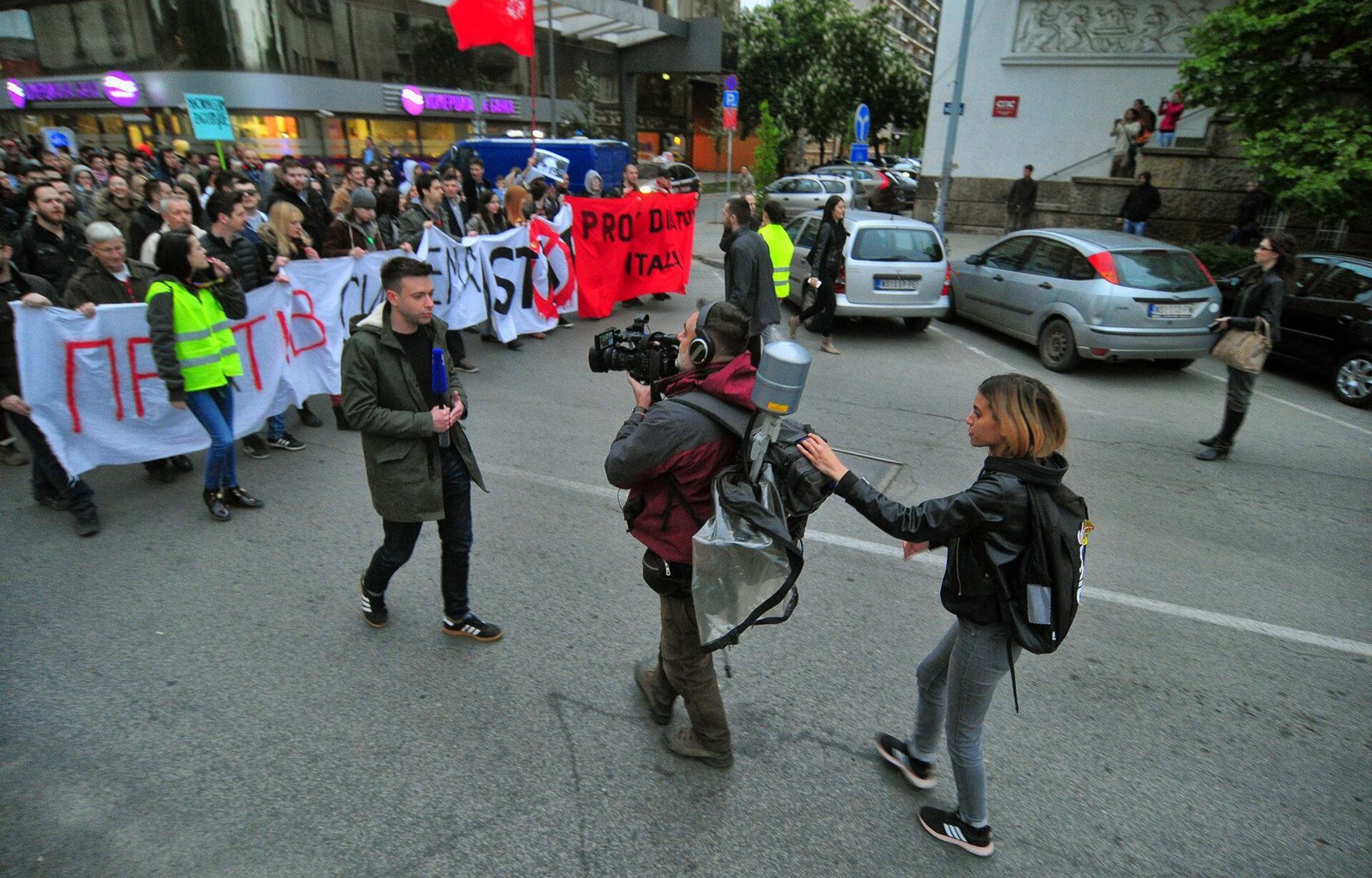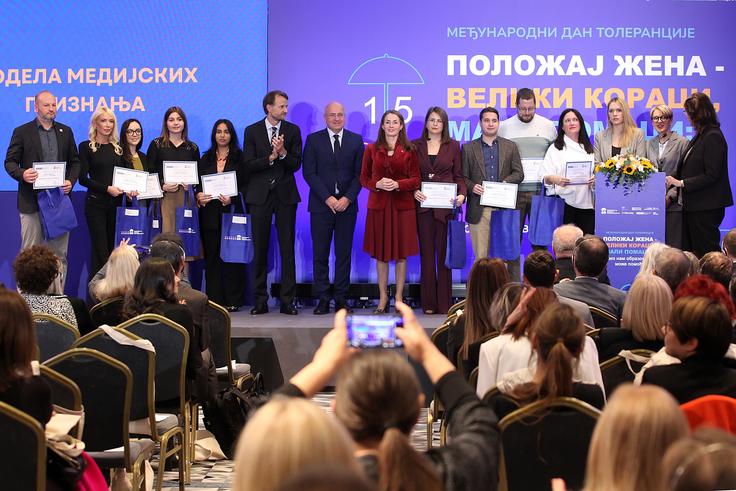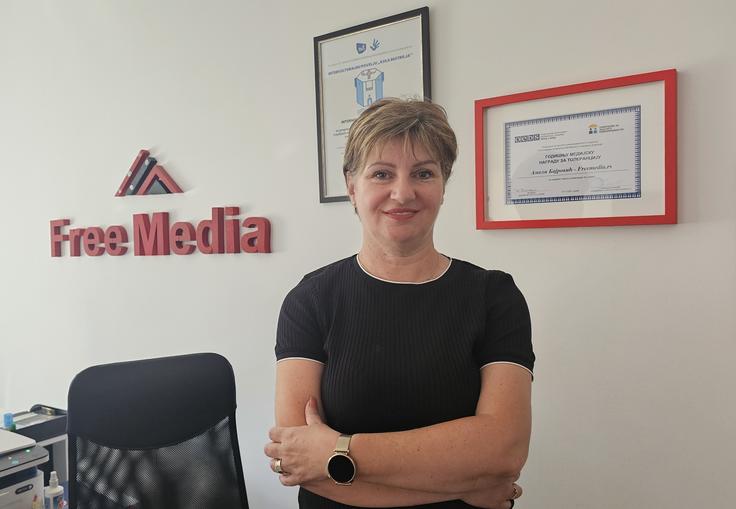
Story
How these journalists’ ethical reporting is breaking barriers and sparking change in Serbia
- Date:
- Source:
- OSCE Mission to Serbia
- Fields of work:
- Media freedom and development
- Focus area:
- Media viability
“What is tolerance to me? Perhaps the bare minimum for a society of equality and democracy,” says Jovana Gligorijevic, the winner of the first-ever Journalism for Tolerance Award in Serbia.
With her piece “The state also rapes, doesn't it?” in Vreme Magazine in 2015, Jovana won the award for her honest reporting on the state’s treatment of women victims of partner violence as a stigmatized and disenfranchised group.
Fast forward ten years and Jovana can now see progress in how the system treats women in judiciary proceedings for sexual violence. Judges used to ask women: “Did you try to fight back, and why didn’t you?” she recalls. “That is no longer the case today.”
Shining a light on the taboo and effecting change
Jovana is only one journalist of over 90 who have since won the award for being a voice for the marginalized and unheard. Established in 2015 by Serbia’s Commissioner for the Protection of Equality and the OSCE Mission in Serbia, the award has been granted annually for best newspaper article, best text published online, and best radio or TV report on the issue of equality and justice.
Winning journalists covered topics ranging from prejudice and stereotypes against persons with disabilities and victims of domestic violence, to the struggles of minority communities such as Roma citizens and refugees, amongst many other topics.
“In the end, the simple task of every journalist is to represent another human being as a human being. It is that simple,” says Miodrag Sovilj, who won in 2018 with his reporting on refugee children from reception centres and their integration into schools in the town of Šid.
Publicly highlighting issues that are often neglected or taken out of context has led to tangible systemic changes in the country, according to Brankica Janković, Serbia’s Commissioner for the Protection of Equality.
For instance, a draft law on the prevention of domestic violence was introduced in 2016. The government also moved to ease the lives of marginalized citizens. New amendments to the Law on Planning and Construction removed various barriers for people with disabilities and prevented forced evictions of Roma communities.
“None of it would have been possible without responsible journalists truly ready for alliance,” adds Commissioner Janković.
The award united journalists and the Commissioner’s Office to shine a light on deep-rooted societal problems and bring justice to the most vulnerable members in the region, where remnants of post-90’s conflict and intolerance still linger.
Over the past decade, this has created a norm for ethical and impartial reporting that journalists in the country have since looked up to, and helped them to be a part of the change they seek in Serbia.
“Zero tolerance for half-truths and lies,” this is the norm they have since upheld, in the words of journalist Radmila Relić.

Winners of 2025 Journalism Award for Tolerance, Belgrade, 17 November 2025.
Like citizens, journalists need to be heard too
Winning is more than fame, glory or material gain for the awardees, it’s about finally being heard. It was a turning point for Amela Bajrović’s story about inter-faith dialogue, a winner in the Radio/TV category in 2023. She said her work “truly gained significance” in the eyes of the public with the recognition of the award.
“The fact that our viewership suddenly jumped at that moment [after winning the award] leads to the conclusion that it is very important when organizations come together, and jointly show care to our work,” says Amela.
Just as Amela and her fellow winners elevated the voices of minority, marginalized, and vulnerable groups, the award amplified their voices, elevating the recognition and credibility of their work in the eyes of the public and the institutions.
“One thing is certain — if we had not drawn attention to these issues, we would not have gotten anywhere, much would have been covered up, much silenced, and we would not have reached many systemic changes,” says Commissioner Janković. “We wanted to have a credible partner on our path, and the OSCE has that international credibility and influence.”
This partnership has created a ripple effect of dialogue and openness. In the end, “a culture of dialogue” is what tolerance means, according to Tamara Tankosić, a 2017 winner.

Amela Bajrovic, 2023 winner in the Radio/TV category, Novi Pazar, 15 September 2025.
A culture of dialogue can only flourish in a culture of trust
Before 2017, Serbia lacked any structured dialogue between authorities and media organizations. Journalists faced barriers just to get their cases heard all the while attacks against them were rising.
The OSCE Mission in Serbia helped shape the framework of the country’s Permanent Working Group for the Safety of Journalists in 2017. The group is an inclusive platform for all key actors — journalists, police, and prosecutors — to focus on strengthening the protection of journalists and mechanisms for addressing crimes committed against them. And the results are real – there has been a nearly 60% success rate in solving assault cases against journalists between 1 January 2016 and 30 September 2025.
Boosted by the award’s inception in 2015, there has been a focus on cultivating relationships: one between the public and the media, and one between the media and the very institutions they monitor.
“In our joint efforts to curb discrimination and prejudice, the role of media is invaluable. In line with OSCE principles and commitments, we recognize the profound impact that free and independent media have on democratic societies—it can either counteract or fuel misperceptions and prejudice,” says the Head of the OSCE Mission to Serbia, Ambassador Marcel Peško.
With their growing network, awardees are on the frontline of this shifting frontier in Serbia, ready to keep raising their voices against injustice.
“I think this is a long road — not [just] a journey of 10 years, but one where we will still have a lot to do to point out all the problems surrounding us,” says a winner, Radmila Relić, looking ahead.
This is the legacy of this work: an environment where ethical reporting is not an act of courage, but an unassailable power by which journalists reject half-truths and lies.

